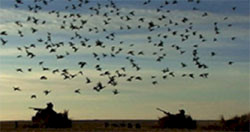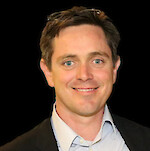It's fowl to be sustainable
Simon Costanzo ·  Paying homage to the annual migrating Canada geese flying overhead, it is apt to discuss the unusual balance that exists around Chesapeake Bay between hunting and conservation. My recent visit to the local Walmart required passage past three aisles of camouflage attire, duck decoys, bird whistles, knives and of course guns. I spotted a whole pallet of discounted ammunition, akin to a half-priced pallet of washing detergent you might see in an Australian supermarket. It was a sight to behold and made me feel somewhat uneasy.
Paying homage to the annual migrating Canada geese flying overhead, it is apt to discuss the unusual balance that exists around Chesapeake Bay between hunting and conservation. My recent visit to the local Walmart required passage past three aisles of camouflage attire, duck decoys, bird whistles, knives and of course guns. I spotted a whole pallet of discounted ammunition, akin to a half-priced pallet of washing detergent you might see in an Australian supermarket. It was a sight to behold and made me feel somewhat uneasy.
My opinion on the practice of hunting (waterfowl and deer), however, has changed since I first arrived. Hunting is a very big and valued activity here and large pockets of land are locked up to protect habitat and thereby the future of hunting. This results in large tracts of forest in an otherwise highly developed environment. Recently we celebrated the Waterfowl Festival that brings together hunters and conservationists alike. Indeed many of the attendees were both.
The more I think about it, Australia has a number of similar paradigms. I did some water quality work for the for the Australian Military that provided access to some of the most beautiful and intact environments in southeast QLD, each of which had zero public access and was out-of-bounds to developers. Tourism has had the same effect in recent years by limiting development, to maintain the environment and ensure the future of the tourism industry.
Is this what sustainability is all about? Users are the best preservers? The traditional owners of our lands certainly had this philosophy. Can we, however, apply this to all uses of our natural resources (e.g. mining)? Food for thought.
About the author
Simon Costanzo

Dr. Simon Costanzo is a Science Integrator at the University of Maryland Center for Environmental Science in Cambridge MD. Simon’s career in environmental science over the past 20 years has been focused on developing and improving methods for the assessment, monitoring and management of aquatic, marine and terrestrial ecosystems. Simon has extensive experience in scientific data collection, synthesis, interpretation and communication. Simon’s career has provided a unique insight to a wide range of disciplines and stakeholder groups including government, academia and private industry. Dr. Costanzo obtained his academic training from University of Queensland in Australia (PhD).

